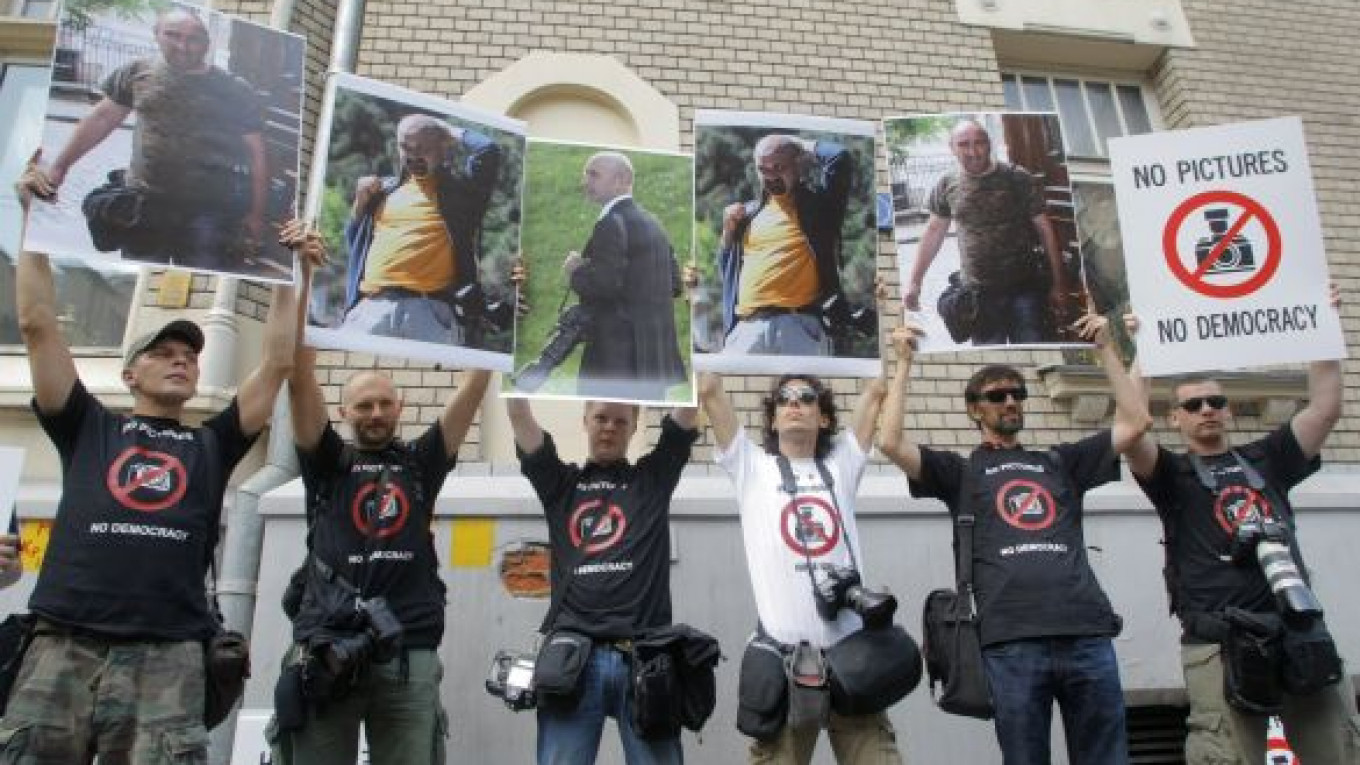Russian journalists rallied in central Moscow on Tuesday against Georgia's arrest of three photojournalists on charges of spying for Russia.
The protesters, who gathered outside the Swiss Embassy, carried signs reading, "Photographers Aren't Spies" and "No Pictures, No Democracy," Interfax reported.
Tbilisi cut diplomatic ties with Moscow after a short war in 2008 and conducts diplomatic matters through the Swiss Embassy.
"We want to show our colleagues from Georgia that we support them and to try to force the Georgian authorities to conduct a transparent investigation," said one of the protesters, photographer Igor Gavrilov, Interfax reported.
President Mikheil Saakashvili's personal photographer and two other suspects are accused of passing classified documents including the floor plan of the presidential building and routes and itinerary of Saakashvili's trips to Russian military intelligence.
The arrests on July 7 shook media circles and prompted street protests by Georgian journalists, who say they have seen little evidence to support accusations of a spy ring at the heart of the presidential administration.
Georgian authorities said over the weekend that all three suspects have confessed.
The Justice Ministry released a videotape of one of the suspects, freelancer Giorgi Abdaladze, who sometimes worked for the Foreign Ministry and The Associated Press.
Abdaladze described being approached by Russian intelligence while detained in South Ossetia's main town of Tskhinvali in 2002 and told to cooperate under threat that his family would be killed.
This involved working with a Georgian political party led by a former senior security official under former President Eduard Shevardnadze, taking pictures of the party rallies.
Then in 2007, when working for the parliamentary press office, Abdaladze said he was approached by co-accused Zurab Kurtsikidze of the Frankfurt-based European Pressphoto Agency, or EPA, who "told me he was also working for one of the Russian agencies."
"He asked me to send him some photos from official meetings," he said. "After a while he asked me to give him not just photos but also minutes of meetings because he needed to send them to Moscow.
"He reminded me verbally about the episode in Tskhinvali and said that he was also working in that business," Abdaladze said.
The video looked unlikely to satisfy critics, including a number of Georgian media outlets and organizations that released a statement saying they would not be convinced by police "extracting confessions under dubious circumstances."
EPA has said it is astonished by the allegations. The Associated Press has not commented on the case.
AP photographer Shakh Aivazov was also arrested but released after several hours without charge.
The Interior Ministry said it has evidence of links between Kurtsikidze and two Russian intelligence officials.
The trio face up to 12 years in jail if convicted, but Georgian news web site Civil.ge, citing an Interior Ministry source, said they could walk free under a plea bargain. The source said Kurtsikidze had requested that the details of his confession not be made public.
A lawyer for one of the suspects said a closed trial for the trio was expected to start Sept. 1, Interfax reported.
(MT, Reuters)A Message from The Moscow Times:
Dear readers,
We are facing unprecedented challenges. Russia's Prosecutor General's Office has designated The Moscow Times as an "undesirable" organization, criminalizing our work and putting our staff at risk of prosecution. This follows our earlier unjust labeling as a "foreign agent."
These actions are direct attempts to silence independent journalism in Russia. The authorities claim our work "discredits the decisions of the Russian leadership." We see things differently: we strive to provide accurate, unbiased reporting on Russia.
We, the journalists of The Moscow Times, refuse to be silenced. But to continue our work, we need your help.
Your support, no matter how small, makes a world of difference. If you can, please support us monthly starting from just $2. It's quick to set up, and every contribution makes a significant impact.
By supporting The Moscow Times, you're defending open, independent journalism in the face of repression. Thank you for standing with us.
Remind me later.






